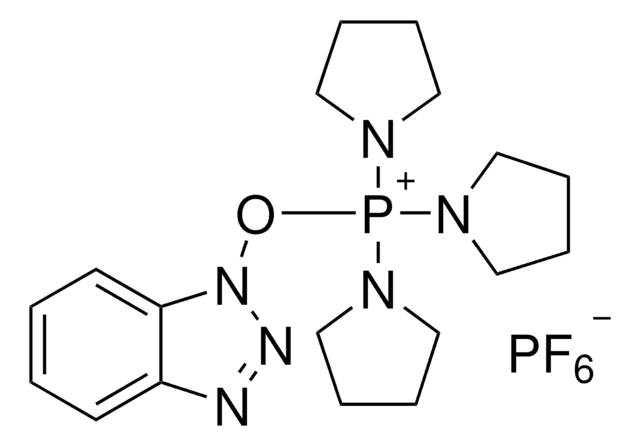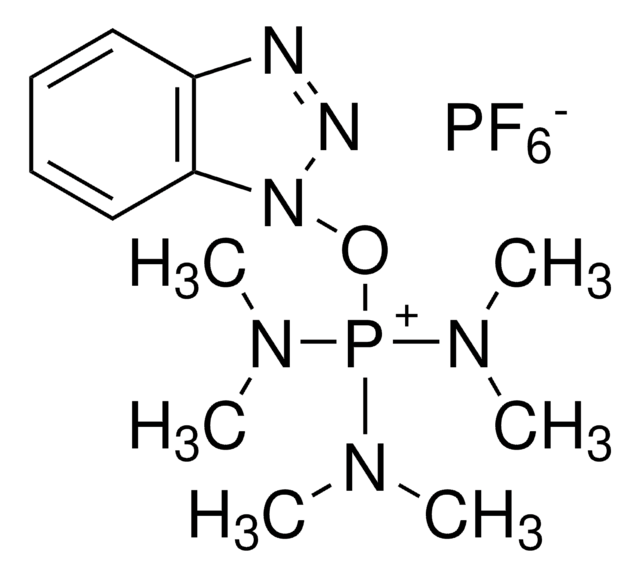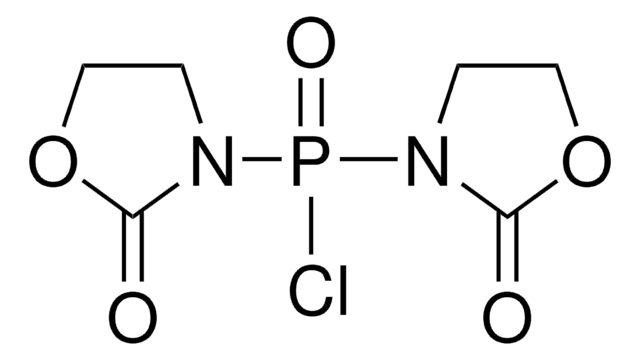535303
(7-Azabenzotriazol-1-yloxy)tripyrrolidinophosphonium hexafluorophosphate
96%, for peptide synthesis
Synonym(s):
(3-Hydroxy-3H-1,2,3-triazolo[4,5-b]pyridinato-O)tri-1-pyrrolidinyl-phosphorus hexafluorophosphate, PyAOP
About This Item
Recommended Products
product name
(7-Azabenzotriazol-1-yloxy)tripyrrolidinophosphonium hexafluorophosphate, 96%
Quality Level
Assay
96%
reaction suitability
reaction type: Coupling Reactions
mp
163-168 °C (lit.)
application(s)
peptide synthesis
storage temp.
−20°C
SMILES string
F[P-](F)(F)(F)(F)F.C1CCN(C1)[P+](On2nnc3cccnc23)(N4CCCC4)N5CCCC5
InChI
1S/C17H27N7OP.F6P/c1-2-11-21(10-1)26(22-12-3-4-13-22,23-14-5-6-15-23)25-24-17-16(19-20-24)8-7-9-18-17;1-7(2,3,4,5)6/h7-9H,1-6,10-15H2;/q+1;-1
InChI key
CBZAHNDHLWAZQC-UHFFFAOYSA-N
Looking for similar products? Visit Product Comparison Guide
Related Categories
Application
Cyclic RGC pentapeptides for functionalization through click chemistry
Fluorescent glucose bioprobes
ReactIR™ flow cell
Reagent for:
Disulfide bond engineering
Heteroaryl ether synthesis
Optimization of conformational constraint on non-phosphorylated cyclic peptide antagonists of the Grb2-SH2 domain
Legal Information
Signal Word
Warning
Hazard Statements
Precautionary Statements
Hazard Classifications
Eye Irrit. 2 - Skin Irrit. 2 - STOT SE 3
Target Organs
Respiratory system
Storage Class Code
11 - Combustible Solids
WGK
WGK 3
Personal Protective Equipment
Certificates of Analysis (COA)
Search for Certificates of Analysis (COA) by entering the products Lot/Batch Number. Lot and Batch Numbers can be found on a product’s label following the words ‘Lot’ or ‘Batch’.
Already Own This Product?
Find documentation for the products that you have recently purchased in the Document Library.
Customers Also Viewed
Our team of scientists has experience in all areas of research including Life Science, Material Science, Chemical Synthesis, Chromatography, Analytical and many others.
Contact Technical Service














